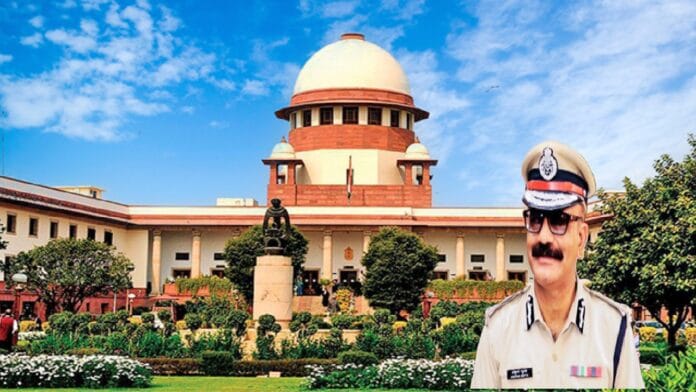In a significant legal development, the Supreme Court has agreed to hear a plea challenging the appointment of Anurag Gupta as Director General of Police (DGP) of Jharkhand. A bench led by Chief Justice B. R. Gavai and Justice K. Vinod Chandran has scheduled hearings for July 30 and 31 and said a three-judge Bench will hear the case after senior advocate Anjana Prakash, representing a social activist, argued that Gupta continued in office in violation of Supreme Court norms.
Background & Legal Challenge:
Under constitutional guidelines laid down in the Prakash Singh judgment, state governments must follow a structured process for appointing a Director General of Police (DGP). This includes sending a list of eligible IPS officers to the Union Public Service Commission (UPSC), which then recommends a panel of three names. The state is required to appoint one officer from this panel, and the selected DGP must be guaranteed a minimum tenure of two years.
In the case of Jharkhand, Anurag Gupta—a 1990-batch IPS officer—was appointed as DGP on February 2, 2025, under newly framed state-specific rules titled the Jharkhand DGP and IG Selection and Appointment Rules, 2025, which were notified on January 8. However, on April 22, 2025, the Union Ministry of Home Affairs wrote to Chief Minister Hemant Soren, stating that Gupta’s tenure could not be extended beyond his scheduled retirement on April 30, 2025. Despite the Centre’s objections, the state government went ahead and retained Gupta as the DGP.
Critics argue that this appointment bypassed the UPSC and violated the established Prakash Singh guidelines. The Centre maintained that any extension post-retirement would contravene the All India Services (AIS) rules, raising serious legal and procedural concerns.
Current Controversy:
BJP leader and Leader of Opposition in Jharkhand, Babulal Marandi, filed a petition in the Jharkhand High Court challenging Gupta’s appointment. The petition contends that the appointment sidestepped the mandatory UPSC panel-based process and was therefore unconstitutional.
Gupta had earlier faced removal by the Election Commission during the 2024 Assembly elections over alleged electoral misconduct. He was reinstated by the newly elected JMM-led government in November 2024 and was formally appointed as DGP in February 2025.
Meanwhile, after Gupta’s retirement date passed, the state treasury stopped his salary. He was issued a provisional pay slip, with a stipulation that any payments would be recoverable if the courts rule his appointment invalid.
What Lies Ahead:
The Supreme Court will now examine whether Anurag Gupta’s continuation in office violates its earlier rulings, particularly the Prakash Singh guidelines. The case carries wide-ranging implications—not only for Gupta’s future—but also for the balance of power between state and central authorities.
With a similar challenge pending before the Jharkhand High Court and key constitutional questions involved, the matter is poised to become a precedent-setting judgment in the coming weeks.
Also Read: Jharkhand HC seeks replies from Centre, State, UPSC on DGP Anurag Gupta’s appointment
Also Read: Ongoing Centre-J’khand standoff over DGP Anurag Gupta escalates with third letter
Also Read: Jharkhand DGP Anurag Gupta working without salary ?
Also Read: Centre describes Anurag Gupta’s continuance as J’khand DGP as ‘illegal’
Also Read: Anurag Gupta continues as J’khand DGP, despite Union Home Ministry’s order to retire



















